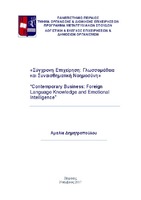Σύγχρονη επιχείρηση: γλωσσομάθεια και συναισθηματική νοημοσύνη
Contemporary business: foreign language knowledge and emotional intelligence

Προβολή/
Λέξεις κλειδιά
Γλώσσα ; Ξένη γλώσσα ; Γλωσσομάθεια ; Γλωσσική διαχείριση ; Συναισθηματική νοημοσύνη ; Language ; Foreign language ; Foreign language knowledge ; Language management ; Emotional intelligenceΠερίληψη
Η παρούσα διπλωματική εργασία επιδιώκει να αναδείξει τη σημασία της Γλωσσομάθειας και της Συναισθηματικής Νοημοσύνης για τη σύγχρονη επιχείρηση και να εξετάσει εάν υπάρχει θετική συσχέτιση ανάμεσα στις δύο έννοιες.
Η διπλωματική ξεκινάει με την θεωρητική-εννοιολογική προσέγγιση των δύο εννοιών και αναλύει τους λόγους για τους οποίους οι έννοιες αυτές είναι ιδιαίτερα σημαντικές για τις σημερινές επιχειρήσεις, τόσο η κάθε μια ξεχωριστά, όσο και συνδυαστικά. Επίσης, στο θεωρητικό μέρος της διπλωματικής, διατυπώνεται το συμπέρασμα ότι φαίνεται να υπάρχει θετική συσχέτιση μεταξύ του επιπέδου Γλωσσομάθειας και ορισμένων πτυχών της Συναισθηματικής Νοημοσύνης.
Στο ερευνητικό μέρος της εργασίας, διερευνάται η ύπαρξη συσχέτισης του επιπέδου Γλωσσομάθειας και του επιπέδου Συναισθηματικής Νοημοσύνης του ατόμου και γίνεται προσπάθεια διαπίστωσής της σε πρακτικό επίπεδο, μέσω της ανάλυσης των δεδομένων που έχουν συλλεχθεί από τη συμπλήρωση ερωτηματολογίων.
Τα βασικά συμπεράσματα, λοιπόν, στα οποία καταλήγει η εργασία είναι τα εξής:
α) Ο μέσος όρος επιπέδου Συναισθηματικής Νοημοσύνης και η γνώση ξένων γλωσσών συσχετίζονται θετικά (όσον αφορά το δείγμα ατόμων που εξετάστηκε), δηλαδή, τα άτομα που ξέρουν τουλάχιστον μία ξένη γλώσσα έχουν υψηλότερο επίπεδο Συναισθηματικής Νοημοσύνης (κατά μέσο όρο), από εκείνα που δε γνωρίζουν καθόλου ξένες γλώσσες.
β) Υπάρχει ισχυρή θετική συσχέτιση ανάμεσα στη Συναισθηματική Νοημοσύνη και τη Γλωσσομάθεια ενός ατόμου, όταν για τη μέτρηση της Γλωσσομάθειας έχει ληφθεί υπ’ όψιν το επίπεδο γλωσσικής επάρκειας του ατόμου στην/στις ξένες γλώσσες που γνωρίζει.
Τα συμπεράσματα αυτά μπορούν να αποδειχθούν ιδιαίτερα χρήσιμα για τον επιχειρησιακό τομέα, καθώς, εάν αξιοποιηθούν καταλλήλως, μπορούν να καταστήσουν τις επιχειρήσεις ικανές να έχουν μια πληρέστερη εικόνα για το ανθρώπινο δυναμικό τους και, έτσι, να το αξιολογήσουν και να το αξιοποιήσουν πιο αποδοτικά και αποτελεσματικά.


